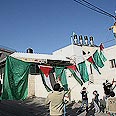
J'lem neighborhoods of Armon Hanatziv and Jabel Mukaber: Peace tenuous notion
Residents of Jewish neighborhood Armon Hanatziv, adjacent to east Jerusalem neighborhood where Mercaz Harav gunman resided, show restraint despite marked tension in the area. ‘Things aren’t the same,’ they say
After last Thursday’s bloody attack at the Mercaz Harav rabbinical seminary, however, tensions between the two neighborhoods run high, and the notion of coexistence has been somewhat forgotten.
"It angers me to look out my window and see pictures of the gunman hanging on cars and windows in Jabel Mukaber,” said Liora Goldman, an Amrmon Hanatziv community activist.
In an effort to ease tensions between the neighboring communities, chairman of the East Talpiot Community Administration, Yehuda Ben Yosef, and his Jabel Mukaber counterpart, Sami Zachelkha, had arranged to meet Monday in order to clear the air between the two neighborhoods.
“These kinds of actions ruin all hope for peaceful coexistence,” said Ben Yosef, “our residents are wary, and the mourner’s tent erected for the gunman only made matters worse, but hopefully we can jointly find a way to carry on.”
Like it or not, the lives of Jabel Mukaber and Armon Hanatziv residents are intimately entwined. Mukaber residents conduct their banking and postal transactions in the Jewish neighborhood, often work there in all manner of odd jobs, and receive childcare services at Armon Hanatziv’s Tipat Halav clinics. The two neighborhoods also share a shopping center “selling some of the tastiest knafeh (Arab dessert) in Israel,” noted Goldman.
Walking on opposite sides of the sidewalk
According to Goldman though, there has always been an invisible line separating residents of the two neighborhoods. “The main road connecting the two neighborhoods had a sidewalk on either side,” she recounted. “Arab residents of Jabel Maukaber walk on one side of the road, and Jewish residents of Armon Hanatziv on the other. I never understood why that is,” she said.
In spite of marked efforts by the community administration of both neighborhoods, there had always been a quiet tension between the residents simmering just below the surface. This animosity came to a boiling point during the first Intifada when Jabel Mukaber residents hurled stones at their Jewish neighbors. “They do not want anything to do with us, and I guess we don’t, either,” said Goldman.

Unfriendly neighbors: Jabel Mukaber and Armon Hanatziv (Photo: Shula Lederman)
Last Thursday’s terror attack quickly brought these tensions to the fore. “I spoke to people in the village and asked them what is wrong with the Arabs and whether they have completely lost their minds,” said Goldman. They simply replied ‘you kill our children every single day.”
“Emotions are still extremely raw following the terror attack,” said Goldman. “It is hard for me to look out my window and see pictures of the gunman hanging on cars and windows in Jabel Mukaber.” In spite of the pain, however, Goldman insists that she does not want right-wingers to stir up tensions in the neighborhood. “We have to live here after all,” she stated.
Yehuda Ben Yosef, Chairman of Armon Hanatziv’s Community Administration, stated that “relations between the two neighborhoods are for the most part civil and orderly. There is a lot of anger right now, especially in wake of the mourning tent erected for the gunman, but I believe the jointly we can work through this and get on with our lives.”
Afraid to go to the park
Rabbi Pinhas Lederman, an Armon Hanatziv community activist, lives with his wife Shula in a home only a few yards away from Jabel Mukaber since 1974. Lederman, a self-proclaimed man of peaceful coexistence, recalls the days when he could walk into the Arab village unperturbed. “I would shop in the village and play billiard with the residents. But then the Intifada broke out and changed everything, Now I am even afraid to give rides to the Arab locales,” he said.
“I always believed in peaceful coexistence with every fiber in my being,” noted Lederman. “After Thursday’s attack people told me that this was proof enough that we cannot negotiate with the Arabs, but I told them there are crazy fanatic in all societies. Like my cardiologist says, the heart is always on the Left.”
Unlike her husband, Lederman’s wife, Shula, has her doubts about peaceful coexistence. “We are afraid now at days. I used to have a friend from Jabel Mukaber. We would cook and spend time together, but after the first Intifada she told me that she could only come into my neighborhood for business,” noted Lederman. “Things have certainly changed around here…”










